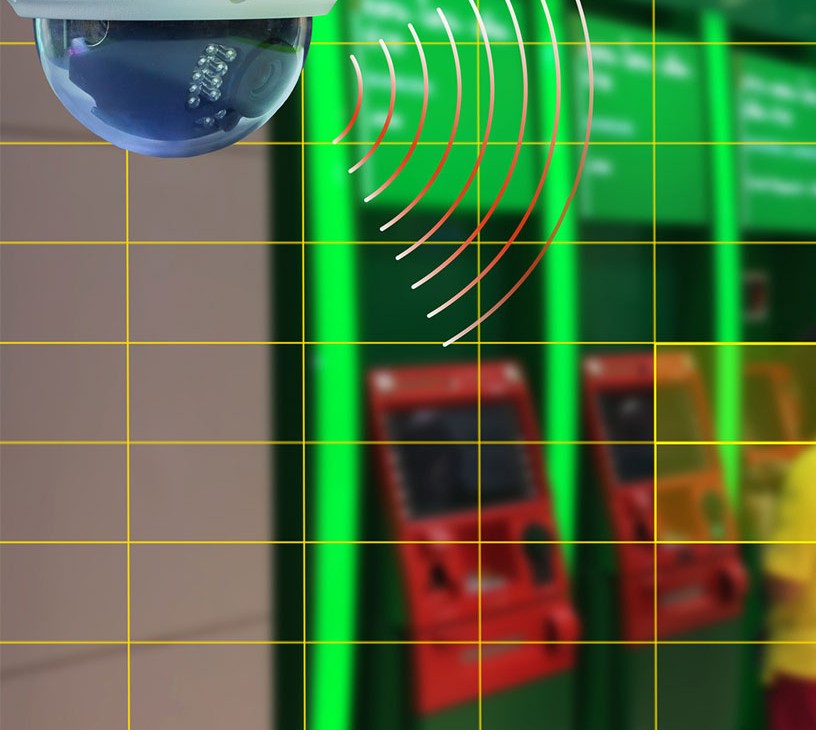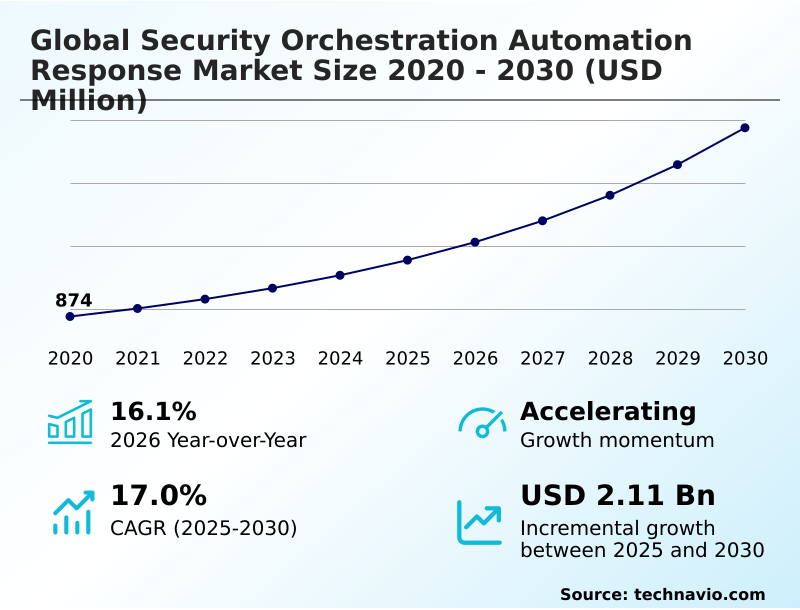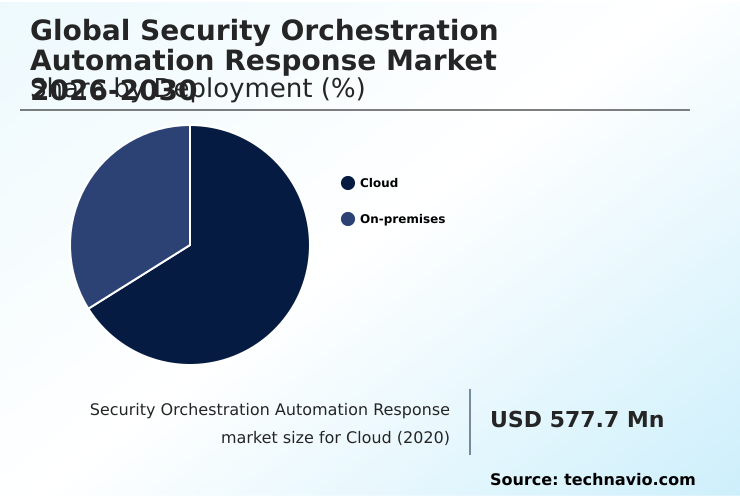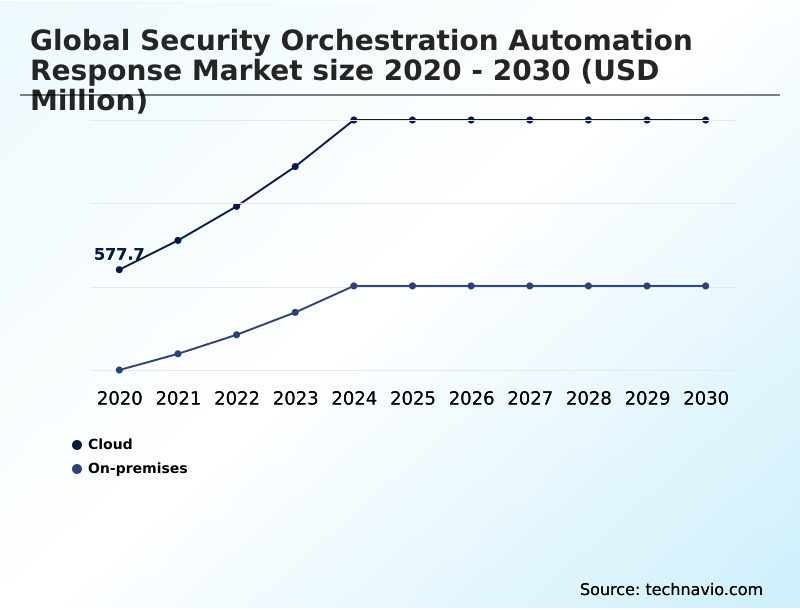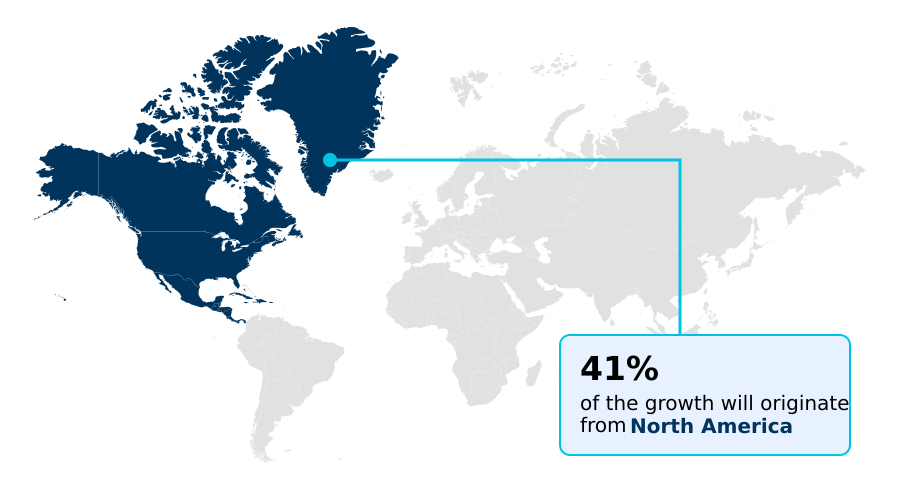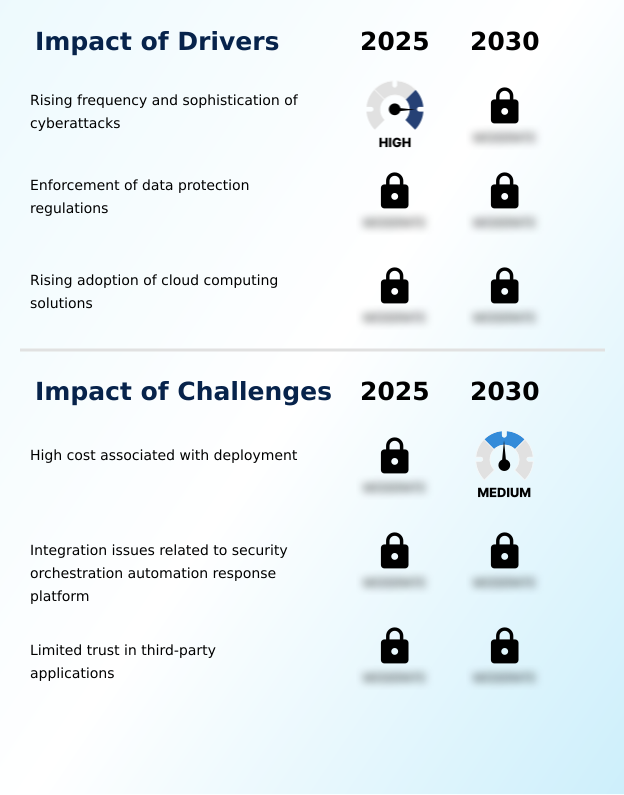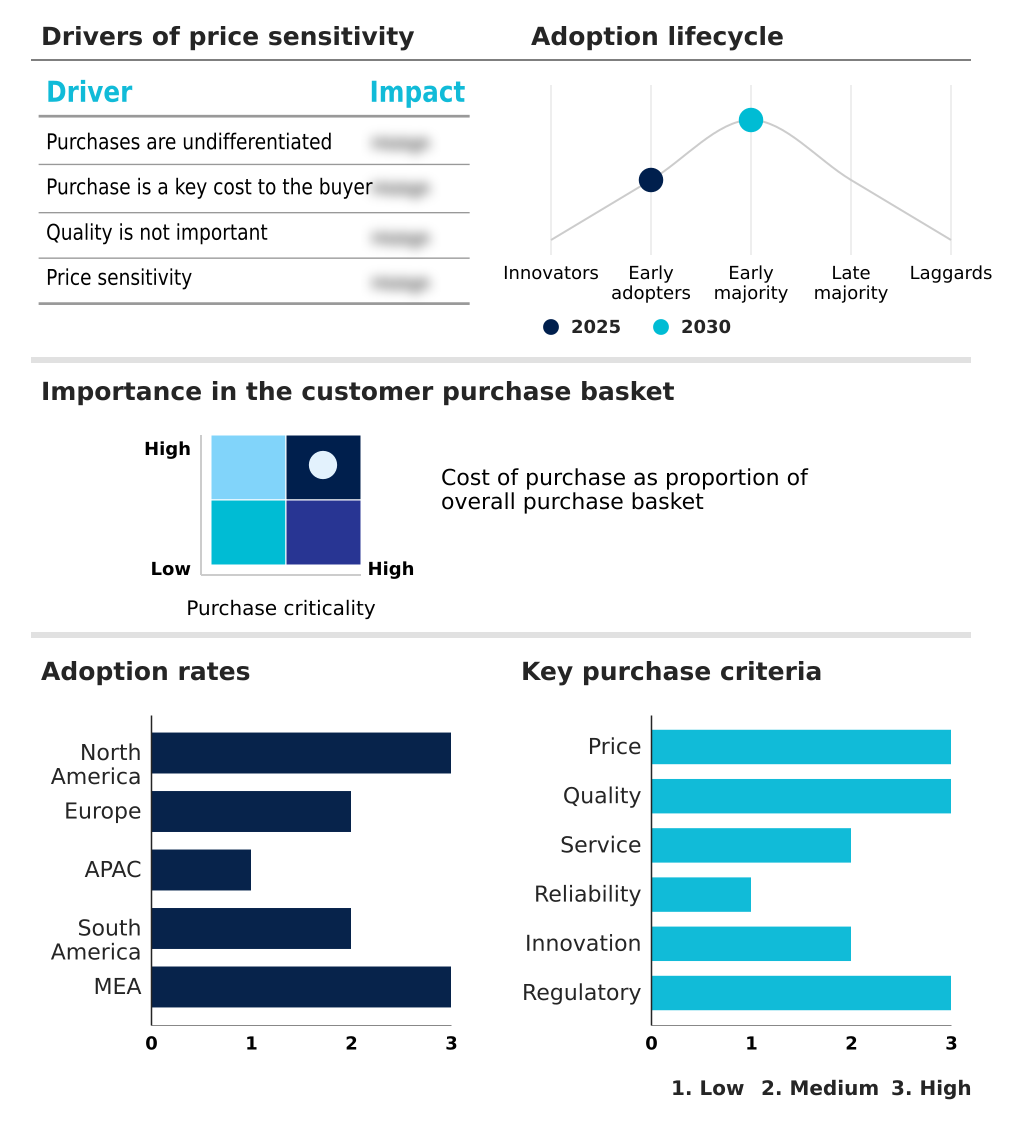Security Orchestration Automation Response Market Size 2026-2030
The security orchestration automation response market size is valued to increase by USD 2.11 billion, at a CAGR of 17% from 2025 to 2030. Rising frequency and sophistication of cyberattacks will drive the security orchestration automation response market.
Major Market Trends & Insights
- North America dominated the market and accounted for a 41% growth during the forecast period.
- By Deployment - Cloud segment was valued at USD 997.3 million in 2024
- By Application - Network forensics segment accounted for the largest market revenue share in 2024
Market Size & Forecast
- Market Opportunities: USD 3.00 billion
- Market Future Opportunities: USD 2.11 billion
- CAGR from 2025 to 2030 : 17%
Market Summary
- The security orchestration automation response market is defined by a fundamental shift toward proactive and automated cybersecurity postures. Organizations are moving beyond manual incident response, leveraging integrated platforms to unify disparate security tools and streamline operations. A key driver is the need to manage an overwhelming volume of alerts while contending with a persistent shortage of skilled security analysts.
- In a typical business scenario, a financial services firm can use these solutions to automate the response to a phishing attack by quarantining affected endpoints, revoking credentials, and blocking malicious domains in seconds, a process that would otherwise take hours. This automation not only accelerates remediation but also ensures consistent, auditable workflows for compliance.
- The adoption of AI and machine learning is further enhancing these platforms, enabling predictive threat analysis and more sophisticated, context-aware decision-making. However, challenges related to integration complexity and the initial investment required for deployment can affect the pace of adoption for some organizations.
What will be the Size of the Security Orchestration Automation Response Market during the forecast period?
Get Key Insights on Market Forecast (PDF) Request Free Sample
How is the Security Orchestration Automation Response Market Segmented?
The security orchestration automation response industry research report provides comprehensive data (region-wise segment analysis), with forecasts and estimates in "USD million" for the period 2026-2030, as well as historical data from 2020-2024 for the following segments.
- Deployment
- Cloud
- On-premises
- Application
- Network forensics
- Threat intelligence
- Incident management
- Others
- Component
- Solution
- Services
- Geography
- North America
- US
- Canada
- Mexico
- Europe
- Germany
- UK
- France
- APAC
- China
- Japan
- India
- South America
- Brazil
- Argentina
- Colombia
- Middle East and Africa
- Saudi Arabia
- UAE
- South Africa
- Rest of World (ROW)
- North America
By Deployment Insights
The cloud segment is estimated to witness significant growth during the forecast period.
The cloud segment is central to the market's evolution, driven by the need for scalable and agile security solutions. Organizations are adopting cloud-native security orchestration to unify their security infrastructure modernization efforts and support hybrid cloud security models.
These platforms are instrumental in deploying hyper-automated security frameworks powered by agentic artificial intelligence, which enables autonomous decision-making during incidents.
The use of generative AI in security for tasks like automated investigation and response is almost exclusively delivered via the cloud.
This approach enhances platform interoperability and facilitates security stack consolidation, with adopters reporting a 35% reduction in redundant security tools.
The security workflow orchestration capabilities and automated remediation actions within a unified security operations platform provide the efficiency required for continuous threat exposure management.
The Cloud segment was valued at USD 997.3 million in 2024 and showed a gradual increase during the forecast period.
Regional Analysis
North America is estimated to contribute 41% to the growth of the global market during the forecast period.Technavio’s analysts have elaborately explained the regional trends and drivers that shape the market during the forecast period.
See How Security Orchestration Automation Response Market Demand is Rising in North America Request Free Sample
North America leads the global security orchestration automation response market, accounting for over 41% of incremental growth, driven by stringent regulatory compliance automation requirements and early adoption of advanced technologies.
The region's focus on unified threat response is evident in its widespread deployment of extended detection and response and cyber fusion solutions.
APAC is the fastest-growing region, with a projected CAGR 1% higher than the global average, fueled by rapid digitalization and the need for sophisticated security operations management.
In Europe, the emphasis is on integrating security information and event management systems for comprehensive cyber risk quantification. Across all regions, network forensics analysis, automated incident management, and threat intelligence sharing are key priorities for defending against persistent threats.
Market Dynamics
Our researchers analyzed the data with 2025 as the base year, along with the key drivers, trends, and challenges. A holistic analysis of drivers will help companies refine their marketing strategies to gain a competitive advantage.
- Enterprises are increasingly adopting specialized strategies to enhance their security posture. An automated playbook for ransomware response is now a critical component for business continuity, while integrating soar with siem platforms creates a unified view of security events and streamlines security operations automation.
- The demand for cloud-based soar for sme cybersecurity is growing, as smaller organizations seek to reduce alert fatigue in soc without significant upfront investment. Concurrently, large enterprises are refining zero trust security orchestration models and using ai for predictive threat hunting to stay ahead of advanced threats.
- Automating compliance with data regulations has become a primary use case, especially for soar implementation in financial services and automating incident response in healthcare. A key performance indicator is improving mttr with soar automation, with some organizations achieving response times up to ten times faster than manual processes.
- This is accomplished by orchestrating response across hybrid environments and leveraging threat intelligence platform soar integration. Capabilities like network forensics automation with soar and soar for endpoint security orchestration provide deep visibility.
- The rise of low-code security automation platforms and generative ai for incident summarization is also democratizing advanced security capabilities, though measuring soar platform roi and managing on-premises soar deployment challenges remain key considerations for scaling security operations with soar. The complexity of managing third-party security integrations continues to be a focus area for platform vendors.
What are the key market drivers leading to the rise in the adoption of Security Orchestration Automation Response Industry?
- The primary market driver is the increasing frequency and sophistication of cyberattacks, compelling organizations to adopt automated security solutions.
- The market's growth is fueled by the need for automated threat response to counter increasingly sophisticated cyberattacks. With the threat landscape complexity expanding, organizations are prioritizing security operations automation to improve mean time to respond reduction by up to 70%.
- The integration of threat intelligence integration feeds directly into real-time threat detection and security alert correlation engines, allowing security teams to manage the entire incident lifecycle management more effectively.
- Strict data protection regulations and mandates like the digital operational resilience act have made automated security a necessity, with non-compliant firms facing fines representing 4% of their annual turnover.
- This regulatory pressure, combined with expanded attack surface management needs and industry-wide threat indicator sharing, solidifies the demand for robust automation platforms.
What are the market trends shaping the Security Orchestration Automation Response Industry?
- A prominent market trend is the rising adoption of hybrid work models, which necessitates advanced orchestration solutions capable of securing distributed and diverse IT environments.
- A primary trend is the adoption of low-code security automation platforms, which addresses the cybersecurity skills gap by enabling security teams to build incident response playbooks with 50% less code. This shift toward security playbook automation facilitates autonomous incident response and proactive threat management, reducing manual intervention by over 60%.
- The integration of predictive threat analysis into these systems allows for effective polymorphic threat defense. As remote work security becomes standard, zero trust architecture integration is critical for validating every access request. Enhanced third-party tool integration capabilities ensure that security ecosystems are cohesive, improving overall business continuity planning and reducing threat containment times by an average of 40%.
What challenges does the Security Orchestration Automation Response Industry face during its growth?
- A key market challenge is the high cost associated with the deployment and maintenance of advanced security orchestration platforms, which can deter adoption.
- A significant challenge is achieving positive security ROI justification, as the total cost of ownership for on-premises solutions can be 2.5 times higher than cloud-based alternatives. On-premises soar deployment challenges and the need for security tool rationalization often delay adoption.
- Organizations struggle with security alert triage automation when integrating disparate systems, such as endpoint detection and response tools, which can lead to complex vulnerability remediation workflow processes. Ineffective security case management and poorly designed incident response playbooks reduce security operations center efficiency, sometimes increasing analyst workloads by 20% during the initial rollout.
- Adherence to strict incident notification timelines becomes difficult without seamless automation, while the reliance on cloud computing solutions raises concerns about data governance and third-party risk.
Exclusive Technavio Analysis on Customer Landscape
The security orchestration automation response market forecasting report includes the adoption lifecycle of the market, covering from the innovator’s stage to the laggard’s stage. It focuses on adoption rates in different regions based on penetration. Furthermore, the security orchestration automation response market report also includes key purchase criteria and drivers of price sensitivity to help companies evaluate and develop their market growth analysis strategies.
Customer Landscape of Security Orchestration Automation Response Industry
Competitive Landscape
Companies are implementing various strategies, such as strategic alliances, security orchestration automation response market forecast, partnerships, mergers and acquisitions, geographical expansion, and product/service launches, to enhance their presence in the industry.
Cisco Systems Inc. - Offers security orchestration and automation solutions designed to unify visibility and accelerate threat response through integrated platforms.
The industry research and growth report includes detailed analyses of the competitive landscape of the market and information about key companies, including:
- Cisco Systems Inc.
- Cyware Labs Inc.
- Exabeam Inc.
- Fortinet Inc.
- IBM Corp.
- Innotim Yazilim LLC
- LogRhythm Inc.
- Musarubra US LLC
- Palo Alto Networks Inc.
- Qi Anxin Technology Co. Ltd.
- Rapid7 Inc.
- Resolve Systems LLC
- SIRP Labs Ltd.
- Splunk Inc.
- Sumo Logic Inc.
- Swimlane Inc.
- ThreatConnect Inc.
- Tufin
Qualitative and quantitative analysis of companies has been conducted to help clients understand the wider business environment as well as the strengths and weaknesses of key industry players. Data is qualitatively analyzed to categorize companies as pure play, category-focused, industry-focused, and diversified; it is quantitatively analyzed to categorize companies as dominant, leading, strong, tentative, and weak.
Recent Development and News in Security orchestration automation response market
- In April 2025, Palo Alto Networks Inc. announced the acquisition of Protect AI for an estimated $700 million, a strategic move to integrate advanced AI security features into its Cortex cloud-native platform.
- In March 2025, the newly merged entity of Exabeam Inc. and LogRhythm Inc. finalized the migration of LogRhythm Cloud clients to the cloud-native Exabeam Security Operations Platform, consolidating their service offerings.
- In April 2025, Fortinet Inc. launched FortiSOAR 7.6.2, an update featuring a new Pluggable Threat Hunt Framework and enhanced data visualization tools to improve threat detection capabilities for security teams.
- In March 2025, the US General Services Administration introduced the FedRAMP 20x initiative, which aims to expedite the authorization process for cloud vendors seeking to offer services to federal agencies.
Dive into Technavio’s robust research methodology, blending expert interviews, extensive data synthesis, and validated models for unparalleled Security Orchestration Automation Response Market insights. See full methodology.
| Market Scope | |
|---|---|
| Page number | 281 |
| Base year | 2025 |
| Historic period | 2020-2024 |
| Forecast period | 2026-2030 |
| Growth momentum & CAGR | Accelerate at a CAGR of 17% |
| Market growth 2026-2030 | USD 2105.4 million |
| Market structure | Fragmented |
| YoY growth 2025-2026(%) | 16.1% |
| Key countries | US, Canada, Mexico, Germany, UK, France, Italy, The Netherlands, Spain, China, Japan, India, South Korea, Australia, Indonesia, Brazil, Argentina, Colombia, Saudi Arabia, UAE, South Africa, Israel and Turkey |
| Competitive landscape | Leading Companies, Market Positioning of Companies, Competitive Strategies, and Industry Risks |
Research Analyst Overview
- The evolution of security orchestration automation response is marked by the integration of agentic artificial intelligence and hyper-automated security frameworks. Enterprises are implementing cloud-native security orchestration to enable autonomous incident response and real-time threat detection. A core function is security alert correlation, which feeds into a unified security operations platform for streamlined incident lifecycle management.
- The use of generative AI in security powers predictive threat analysis and automated remediation actions, directly contributing to mean time to respond reduction. For instance, organizations have reported a 45% improvement in security operations center efficiency by implementing automated security workflows and security playbook automation.
- These platforms centralize security case management, perform network forensics analysis, and orchestrate vulnerability remediation workflow across integrated systems, including endpoint detection and response. With zero trust architecture integration and sophisticated encrypted traffic analysis, the focus is on creating a unified threat response mechanism that handles everything from threat intelligence integration to automated incident management with precision.
What are the Key Data Covered in this Security Orchestration Automation Response Market Research and Growth Report?
-
What is the expected growth of the Security Orchestration Automation Response Market between 2026 and 2030?
-
USD 2.11 billion, at a CAGR of 17%
-
-
What segmentation does the market report cover?
-
The report is segmented by Deployment (Cloud, and On-premises), Application (Network forensics, Threat intelligence, Incident management, and Others), Component (Solution, and Services) and Geography (North America, Europe, APAC, South America, Middle East and Africa)
-
-
Which regions are analyzed in the report?
-
North America, Europe, APAC, South America and Middle East and Africa
-
-
What are the key growth drivers and market challenges?
-
Rising frequency and sophistication of cyberattacks, High cost associated with deployment
-
-
Who are the major players in the Security Orchestration Automation Response Market?
-
Cisco Systems Inc., Cyware Labs Inc., Exabeam Inc., Fortinet Inc., IBM Corp., Innotim Yazilim LLC, LogRhythm Inc., Musarubra US LLC, Palo Alto Networks Inc., Qi Anxin Technology Co. Ltd., Rapid7 Inc., Resolve Systems LLC, SIRP Labs Ltd., Splunk Inc., Sumo Logic Inc., Swimlane Inc., ThreatConnect Inc. and Tufin
-
Market Research Insights
- The market's momentum is driven by security stack consolidation, where organizations achieve up to a 30% reduction in tool management overhead. As sophisticated cyberattacks grow, the focus shifts to proactive threat management and attack surface management to minimize vulnerabilities.
- The adoption of cloud computing solutions accelerates this trend, with cloud-native platforms demonstrating a 40% faster deployment time compared to traditional on-premises systems. This move is also influenced by the need to navigate complex data protection regulations and address the widespread cybersecurity skills gap.
- Enterprises are prioritizing platform interoperability to build resilient security ecosystems capable of handling the increasing threat landscape complexity, which improves overall operational efficiency by over 25%.
We can help! Our analysts can customize this security orchestration automation response market research report to meet your requirements.
